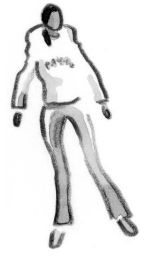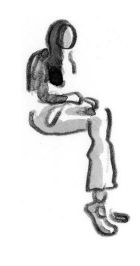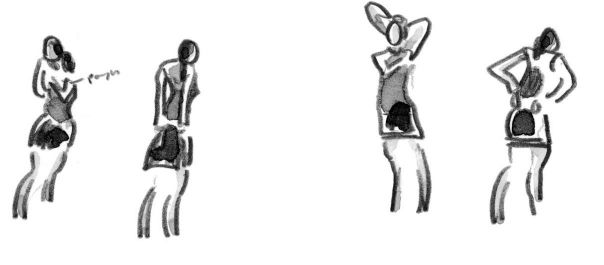Ridiculous/Hilarious/Terrible/Cool (5 page)
Read Ridiculous/Hilarious/Terrible/Cool Online
Authors: Elisha Cooper

“I've always liked that sort of thing, corporations,” she says, striding through the hallways after lunch. Emily is wearing jeans and a gray sweatshirt with PAYTON on the chest, her hair pulled tight in its ponytail. Eyes steady, she explains, “I just want to make a lot of money.”
This is not entirely true, as Emily also says that her ultimate goal is power.

Emily often plays with her words, pausing to gauge their effect on whomever she's talking with. It's sometimes a question how seriously to take her, especially when she follows whatever she says with her big goal-scoring grin.
Emily lives down in Hyde Park, in a red brick house with a tall chimney on a shaded street near the University of Chicago. Her bedroom is filled with soccer trophies and soccer medals. Out her window she has a view of her backyard, which has a pond and a fountain. On her wall is a painting of an evergreen tree in winter, which Emily bought at a local art fair after saving her allowance when she was young.
Emily's father is a lawyer, her mother a school principal. Her parents divorced when she was in the sixth grade. They remain friends, and the family often gathers for dinners and soccer games. Emily lives with her mother, but is close with both parents. She's the oldest of three sisters. Being the oldest has always made her responsible.
Emily feels responsible for many things in her life. She feels responsible for her studies, for getting straight A's (almost). She feels responsible for helping friends with their homework (which takes longer than her own homework). She feels responsible for acing her college boards, for writing a smart college application essay (intelligent design: wrong).
Mostly, Emily feels responsibility to herself. She just has high expectations. But she doesn't worry much. Emily has little patience for those who worry. Emotions are a sign of weakness, and best kept in check. Emily says her soccer coach at Payton doesn't like it when girls on the team get weepy. A strong exterior is best.
There are few cracks in Emily's exterior. She doesn't trust people easily, doesn't let them in. But then, in the smallest of openings, she admits something: She has a crush on a boy. She hasn't mentioned it to anyone, and hasn't done anything about it. She changes the subject. Her coach was right. Never show weakness.
The first brisk day of fall. Fog wreaths the top of the Sears Tower to the south of school. Passing trains on the "L” sound muffled. As students enter the front door many wear sweatshirts.
Maya Boudreau, the actor with the girl-next-door looks, sits in her English class wearing a long-sleeved Anthropologie shirt and an old pair of jeans. Around her neck is a pastel-flowered scarf. She's fidgeting as usual.

The class is reading
Huck Finn
and discussing race. Ms. Murphy, the teacher, walks around the circle of chairs, trying hard to lure the students into a discussion. Ms. Murphy has a scar above her left eye (courtesy of some sibling roughhousing when she was four). The curve of the scar runs parallel to her eyebrow, giving her face an extra attentiveness. But despite her scar, and her encouragement, the subject of race remains too fraught for the students to say much about, here in Chicago, let alone in America.
Huck Finn
and discussing race. Ms. Murphy, the teacher, walks around the circle of chairs, trying hard to lure the students into a discussion. Ms. Murphy has a scar above her left eye (courtesy of some sibling roughhousing when she was four). The curve of the scar runs parallel to her eyebrow, giving her face an extra attentiveness. But despite her scar, and her encouragement, the subject of race remains too fraught for the students to say much about, here in Chicago, let alone in America.

Maya watches Ms. Murphy and her classmates struggle, smoothing her hands as if she were washing them. It makes her appear nervous.
Maya is not acting this fall. She's focusing on her applications. She's applying to the theater programs at Northwestern, NYU, and UCLA. She's also applying to Stanford, which she feels is a long shot despite her good grades. Maya will also be directing one of the five student-directed plays this fall, but that is less important than figuring out where she will be next year, which school will let her become what she has always dreamed of becoming: an actor.
When Maya acts, she is not nervous. Her fidgeting disappears.
“It's the most relaxing thing ever.
Ever,
” she says. In the many roles she's had, from those in
The Seagull
to
Caucasian Chalk Circle,
Maya has a certain stage presence. Even playing the weird strung-out characters she prefers, she has an uncanny calmness. Eyes gravitate to her. It's as if she's not acting.
Ever,
” she says. In the many roles she's had, from those in
The Seagull
to
Caucasian Chalk Circle,
Maya has a certain stage presence. Even playing the weird strung-out characters she prefers, she has an uncanny calmness. Eyes gravitate to her. It's as if she's not acting.
Ms. Murphy says Maya writes like a dream. Ms. Murphy also says that Maya is the girl Ms. Murphy would have wanted to be in high school. An actor, a writer, someone smart
and
pretty. Maya invites this sort of admiration, and yet this is the same girl who, sitting in class now, has just put a sizable chunk of her hair into her mouth and is chewing it.
and
pretty. Maya invites this sort of admiration, and yet this is the same girl who, sitting in class now, has just put a sizable chunk of her hair into her mouth and is chewing it.
Maya's two older sisters often ask her why she doesn't have a boyfriend. Her friends from Bourbonnais, the small town in Illinois where she grew up, wonder the same thing. All her friends in Bourbonnais have boyfriends. They all go with their boyfriends to their high school dances. Maya tells them that in Chicago, things are different. It's a cultural thing. Here, students go to parties and hook up.
In any case, the differences don't matter to Maya. She doesn't like going to parties, or to dances. She'd rather go to a play.
In two months, Maya will turn eighteen. Despite the prodding from her Bourbonnais friends and her sisters, she doesn't want a boyfriend. Not one at Payton anyway. The boys at Payton are “always
there
.” Like the two good-looking shaggy-haired boys sitting on either side of her, she's with them all the time. They're just friends. They hold no attraction for her.
there
.” Like the two good-looking shaggy-haired boys sitting on either side of her, she's with them all the time. They're just friends. They hold no attraction for her.
“I've gone through them all,” she says, “in my head.”
A teacher hops onto a bench in the atrium and starts shouting instructions.
No
sunglasses,
no
gum,
no
iPods,
no
pagers. Cell phones, if they are brought,
must be turned off.
No
sunglasses,
no
gum,
no
iPods,
no
pagers. Cell phones, if they are brought,
must be turned off.
Some English classes are taking a field trip to Steppenwolf Theatre. After the buses drop everyone off at the theater, the students are herded to their seats. A Steppenwolf representative comes onstage and reiterates what is not allowed. Don't do this, don't do that. Cell phones, of course,
must be turned off
.
must be turned off
.
The lights go down, the play begins: Athol Fugard's “
Master Harold” . . . and the Boys
. The performance proceeds with all the professionalism and attention one would expect of one of the country's best theaters, and then, right in the middle of the climactic scene, from the back of the theater,
brreeeiinnngg
. A cell phone. No way. The students swivel their heads to see who could be so incredibly dumb. Somebody is in
big
trouble. Well, no. Jumping out of his seat and out the theater door to answer his cell phone is K. Todd Freeman, the play's middle-aged director.
Master Harold” . . . and the Boys
. The performance proceeds with all the professionalism and attention one would expect of one of the country's best theaters, and then, right in the middle of the climactic scene, from the back of the theater,
brreeeiinnngg
. A cell phone. No way. The students swivel their heads to see who could be so incredibly dumb. Somebody is in
big
trouble. Well, no. Jumping out of his seat and out the theater door to answer his cell phone is K. Todd Freeman, the play's middle-aged director.
Diana Martinez and Sandra are best friends. Suki used to be their best friend too. Last year it was the three of them, inseparable. Diana, Sandra, Suki. They hung out during school, they went shopping after school, and at night they talked on the phone for hours. Sometimes they'd coordinate and come to school the following day in matching outfits.
But this year, something happened between Suki and the other two, and Diana is not sure what.
“It's not like she told my secret or anything, it's not like I told hers,” she says quietly as she shuffles through the halls, her voice just audible over the constant slamming lockers, scuffing sneakers, and flushing toilets. Diana ignores the noise and talks about what may have caused the rift.
Maybe it had something to do with junior prom. Suki kissed a boy and didn't tell Diana and Sandra. Diana made fun of the boy in front of Suki. Feelings were hurt.
Or maybe it had something to do with the distances between where they live. Suki lives in Evanston, a suburb north of the city. It took an hour for Diana to drive there from her home on the West Side, and soon after arriving she'd have to turn around and drive back. Chicago is wide and flat, and where you live means something.
Or maybe it had to do with race. Suki has been hanging out with white and Asian friends. Suki is half-white, half-Asian. Sandra is half-white, half-black. Diana is all Latina.
And maybe it's just something that cannot be explained. In life, things happen. Diana believes people are going to do what they are going to do. You can't make someone into something they're not.
Diana has bigger worries. Her older brother moved back home. He had been living with his wife and baby boy at his in-laws', but things didn't work out. Now he's around the Martinez house all the time. His friends are calling at two in the morning and he can't afford a cell phone. Along with her sisters, he's always telling Diana what to do. It's been stressful.
The stress makes her look forward to swim practice even more. Every afternoon, fifty laps that keep her sane. Two hours that belong to her alone, that allow her to think, to arrange and rearrange the various parts of her life.
“It's relaxful. I just think about
everything,
” she says, then pauses. “I talk to myself a lot.”
everything,
” she says, then pauses. “I talk to myself a lot.”
Each morning, students gather in homeroom advisory for ten minutes of unintelligible announcements from the principal. Something about a band concert, something about homecoming. The students are supposed to listen. No one does.
A teacher tries to hush her students: “Listen to the announcement! ”
A student responds: “I'm listening, with one ear!”
It's homecoming week, and the walls and lockers of the high school have been plastered with orange construction paper, handmade signs reading
Payton Pride
. Football players strut through the halls in their jerseys. Payton recently adopted the Chicago Bears logo and changed their mascot to the Grizzlies, though the previous name of Navigators remains on the team's uniform. This improvisational quality extends to Payton's stadium. They don't have their own, and borrow that of nearby high school Lane Tech's. Homecoming is not at home.
Payton Pride
. Football players strut through the halls in their jerseys. Payton recently adopted the Chicago Bears logo and changed their mascot to the Grizzlies, though the previous name of Navigators remains on the team's uniform. This improvisational quality extends to Payton's stadium. They don't have their own, and borrow that of nearby high school Lane Tech's. Homecoming is not at home.
Saturday breaks clear and bright. Lane Tech's stadium is directly in O'Hare Airport's flight path, and planes fly low overhead, their silver sides glinting in the sun. Joining the planes are V's of geese flying so close to the field that a punt could hit them.

Other books
Asimov's SF, January 2012 by Dell Magazine Authors
The Lucky One by Nicholas Sparks
Death Match by Lincoln Child
Surrender by Heather Graham
Hunk for the Holidays by Katie Lane
Falling for the Secret Billionaire: Part 2 by Mia Caldwell
Varamo by César Aira
The Destroyer of Worlds by Jonathan Moeller
Across the River by Alice Taylor
Wedding Rows by Kingsbury, Kate